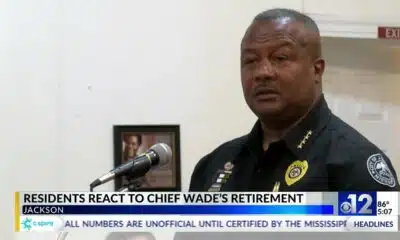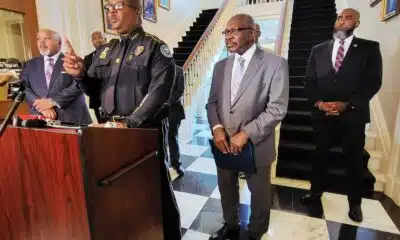Mississippi Today
Gov. Tate Reeves’ top political donors received $1.4 billion in state contracts from his agencies

Gov. Tate Reeves’ top campaign contributors netted $1.4 billion in state contracts or grants from agencies the governor oversees, a Mississippi Today investigation found.
Of the 88 individual or corporate donors who have given Reeves’ campaigns at least $50,000, Mississippi Today identified 15 donors whose companies received a total of $1.4 billion in state contracts or grants since he took office in 2020.
The investigation reveals how private companies, whose executives routinely donate large sums to politicians, can rake in hundreds of millions in Mississippi taxpayer funds while having the ear of powerful elected officials.
Reeves, one of the most prolific political fundraisers in state history, has set numerous annual and office-specific campaign donation records. But he’s been criticized by Republican and Democratic opponents as transactional — a politician who helps those who directly help him.
The $1.4 billion total in state contracts identified by Mississippi Today does not include dozens of additional contracts the Reeves donors have received from state agencies not led by the governor. For example, the Mississippi Department of Transportation awarded the governor’s top donors at least $552 million since 2020.
The total also doesn’t include millions in incentives and tax breaks many of his top donors have received, and it doesn’t include any state contracts that Reeves donors who have given less than $50,000 may have received.
READ MORE: How we reported our investigation into state contracts awarded to Gov. Tate Reeves’ top donors
Unlike many other states, Mississippi has no general “pay-to-play” prohibition, restrictions or special reporting requirements for campaign contributions from people or companies doing business with state government.
In fact, it’s common for owners or executives of companies that reap millions of dollars a year from Mississippi taxpayers to be among the largest donors to the state’s top public officials.
And it’s not just Reeves.
The governor’s campaign has accused his Democratic challenger Brandon Presley, who has served 15 years on the Public Service Commission, of illegally accepting campaign contributions from companies that had business before the commission. One company highlighted in Reeves’ public complaints gave Presley at least $16,500 in campaign donations.
Presley did vote to grant the company approval for a project, but he and others — including one of his Republican colleagues on the commission — maintain accepting the contributions did not violate state law.
READ MORE: Solar company’s donations to Brandon Presley appear legal. But should he have accepted them?
Examples of donors whose companies received state contracts
Centene
The second largest campaign donor to Reeves is also the single largest state contract recipient — and one that recently had to settle a lawsuit claiming it overcharged state agencies.
Centene, a St. Louis-based health care company that ranks 25th on the Forbes list of top 500 companies, is the nation’s largest Medicaid managed care company. Through its subsidiary company Magnolia Health, it is the recipient of a $1.2 billion managed care contract.
Centene LLC has contributed $318,000 during Reeves’ political campaigns, including a single check for $100,000 in 2023. The Centene PAC has contributed another $44,000 over the course of Reeves’ career.
In 2022, Centene was among three companies selected by Reeves’ Division of Medicaid to continue to provide managed care services to Medicaid patients. The contracts were awarded through a blind bidding process. It is estimated the total cost of the latest Centene contract is around $1.2 billion, though those numbers are fluid based on various factors, such as the number of people enrolled in Medicaid.
Magnolia, the Centene subsidiary, has a long relationship with the Mississippi Medicaid program. Since 2017, Magnolia has received state contracts totaling more than $9 billion. Those contracts were awarded before Reeves was governor, though they came while he was lieutenant governor and serving as the presiding officer of the Senate.
Centene received its most recent contract extension after settling a lawsuit filed in 2021 by the state of Mississippi. That settlement — $55 million — came after state Auditor Shad White and Attorney General Lynn Fitch accused another Centene company of overcharging the state for prescription drugs for Medicaid patients.
In 2022, after the Centene lawsuit settlement, Republican state Rep. Becky Currie of Brookhaven offered and passed a House amendment that would have prohibited Centene from receiving another state contract. While the amendment passed the House, it died later in the legislative process.
“I am doing away with doing business with the company who took $55 million of our money that was supposed to be spent on the poor, the sick, the elderly, the mentally ill, the disabled,” Currie said of the Centene contract at the time. “Last year in 2021, Centene brought in a $126 billion profit. They are in other states, that’s not just from us. But that’s all taxpayers’ money. They don’t make anything, they don’t take care of anybody, they don’t do anything, they just get taxpayers’ money from states.”
Centene officials did not respond to requests for comment.
READ MORE: See who has donated to Tate Reeves from 2003-2023
Rob Wells and YoungWilliams
Rob Wells, the CEO of Ridgeland-based YoungWilliams law firm that receives one of the state’s largest contracts, has contributed at least $173,500 individually to Reeves going back through his political career.
Since Reeves was elected governor, the Mississippi Department of Human Services, which Reeves oversees directly, awarded YoungWilliams a $135 million state contract to collect child support payments.
In late 2020, Mississippi Today published a story revealing Wells’ contributions to Reeves and other politicians as well as questions about YoungWiliams’ contract with the state. After the article was published, Wells stopped donating individually to Reeves. But he has still found a way to get his personal political contributions to the governor.
Wells donated $120,000 to a newly formed political action committee called the MS Build PAC, according to records filed with the Secretary of State. The PAC has since diverted at least $80,000 of its funds to Reeves’ campaign.
And before Reeves’ governorship, when the Department of Human Services was overseen by former Gov. Phil Bryant, YoungWilliams had received a $58 million state contract.
Reeves was presiding over the Senate as lieutenant governor when legislation was passed to allow the child support program to be privatized, thus opening the door for the contracts received by YoungWiliams.
According to the Transparency Mississippi web page, the latest YoungWilliams contract was awarded through a competitive bidding process.
Wells did not respond to requests for comment.
Neil Forbes and Horne LLP
Neil Forbes, one of Reeves’ top political donors, is the managing partner of Horne LLP, a Ridgeland-based accounting firm that has dozens of contracts with numerous state agencies.
Since Reeves was elected governor, Horne has received at least $13 million in contracts from agencies Reeves directly oversees.
When COVID-19 gripped the state and gutted the economy, the Mississippi Department of Employment Services was overrun with unemployment requests. The federal government had appropriated millions to Mississippi and other states to supplement their own existing unemployment funds. With tens of thousands of Mississippians out of work and a huge pot of money available to assist them, the state’s employment agency needed help.
In April 2020, Forbes, on behalf of Horne, signed a $10 million contract with MDES to establish a call center and workflows to help the state with the surge of unemployment requests. Forbes signed a second contract with MDES in April 2021 that was worth $2.2 million for the same purpose.
In both cases, Reeves signed emergency orders allowing the state’s employment agency to enter into no-bid, emergency contracts with Horne. Outside those two COVID-related contracts, Horne also received an additional $455,000 in state contracts from other agencies Reeves oversees.
Forbes, who was made a managing partner of Horne in 2021, had never donated to Reeves’ campaigns before the massive COVID-era contracts came. But on Aug. 25, 2021, Forbes cut Reeves a first campaign check for $2,500. The next month, in September 2021, Forbes wrote Reeves a $10,000 check. In two separate checks in 2022, Forbes wrote another $20,000 to the governor.
Then in February of 2023, just two weeks after Presley announced he would challenge Reeves’ bid for reelection, Forbes wrote Reeves a $25,000 check.
While Forbes began writing checks to the governor, so did his wife. Avery Forbes wrote Reeves a $5,000 check in July 2022 — also her first to the governor. And on April 27, 2023, she wrote Reeves a $25,000 check.
In total, the Forbeses, who had never given to Reeves before Neil Forbes became managing partner at Horne in 2021, have given the governor’s campaign $87,500 in contributions.
Neil Forbes did not respond to requests for comment.
Covington Civil & Environmental
Covington Civil and Environmental, an engineering consultant firm with offices in Gulfport and Mobile, is one of Reeves’ largest donors.
The company has donated more than $66,000 to his campaigns. Company officials and related LLC’s have also given thousands more to Reeves.
Covington, despite having little experience at the time in environmental restoration, garnered contracts worth $36 million from former Gov. Phil Bryant’s administration from the state’s $2.2 billion settlement over the Deepwater Horizon oil disaster in 2010.
Under Reeves’ administration, Covington has gotten $792,000 in contracts, including a $500,000 no-bid contract from Reeves’ Department of Finance and Administration to help supervise the state’s federally funded broadband internet expansion efforts.
Covington did not respond to requests for comment.
Other states limit political donations from contractors
Some states, including California, Connecticut, Hawaii, Kentucky, New Jersey, Ohio, South Carolina and West Virginia, have prohibitions or strict limits on campaign donations by government contractors to politicians. Others, including Maryland, New Mexico, Pennsylvania and Rhode Island have special campaign donation reporting requirements for companies and their officers who contribute to candidates.
In the early 2000s, numerous states and large cities considered or enacted pay-to-play restrictions or prohibitions. Often these were in reaction to scandals or corruption.
But since the 2010 U.S. Supreme Court Citizens United ruling, there has been less of a push for such limitations. In that case the high court held First Amendment freedom of speech prohibits the government from restricting independent expenditures by corporations on behalf of political campaigns. Some state courts followed suit. For example, in Colorado, a constitutional amendment passed by voters prohibiting sole-source state contractors and their families from contributing to campaigns was struck down as unconstitutional by the state’s Supreme Court.
Reform supporters say unregulated political contributions present a real danger of corruption, or at least the appearance of corruption, in government contracting. Opponents of such laws say prohibitions or restrictions on campaign contributions by government contractors limit their freedom of speech.
Mississippi’s campaign finance, lobbying and ethics laws and reporting requirements are notably weak, and contained in a piecemeal patchwork of confusing — and some conflicting — laws passed over many years. But even if Mississippi had stricter campaign finance laws, it’s unclear who might enforce them.
The secretary of state’s office and Ethics Commission have for years said they lack enforcement or investigative authority. The secretary of state’s office is responsible for receiving campaign finance reports but serves mainly as a repository, with no real investigative or enforcement authority. The Ethics Commission, after some changes to laws in recent years, appears to have some authority, but it’s unclear.
“It’s a mess,” state Ethics Commission Director Tom Hood said recently of Mississippi’s campaign finance laws. “Changes (to the law) have been made multiple times over multiple years, and it’s like trying to put together a jigsaw puzzle that doesn’t fit.”
Attorney General Lynn Fitch, as the state’s top law officer, runs the only state agency with clear authority to investigate and prosecute campaign finance violations. But Fitch, like her recent predecessors, has shown little interest in investigating or prosecuting complaints and enforcing campaign finance laws.
Mississippi attorney general actions on campaign finances or lobbying over the years have been so rare that, when they do happen, they bring outcry of selective enforcement.
Most often, campaign finance violations go unchecked, leaving the state political system open to the corrosive influence of special interest money.
Mississippi’s system also lacks transparency. For instance, unlike all neighboring states, Mississippi’s campaign finance reports are not electronically searchable. They are PDF files, and some politicians still submit hand-written reports. One in recent years submitted hers in calligraphy.
Mississippi allows politicians (except some judges) to take unlimited campaign contributions from individuals, LLCs and PACs. While there is a $1,000-a-year limit on corporate donations, this is easily sidestepped by corporate officers or lobbyists donating large amounts.
State lawmakers for many years have been loath to enact meaningful reform, transparency or oversight of the intersection of politics and money. This leaves the door wide open for corruption.
Numerous complaints about Mississippi money in politics
This year’s statewide campaign cycle has seen numerous complaints about alleged campaign finance violations, in several races besides the gubernatorial one. Earlier this year, out-of-state dark money groups pumped more than $1.4 million into the Republican primary race for Mississippi lieutenant governor, in support of unsuccessful GOP candidate Chris McDaniel. Incumbent Lt. Gov. Delbert Hosemann filed legal complaints with the AG’s office.
There have been other questions about Public Service Commission candidate campaign finances this election cycle. PSC candidates face stricter campaign finance laws, enacted by state lawmakers years ago after past scandals and corruption with the utility regulating authority. PSC candidates are prohibited from taking contributions from officers of public utilities whose rates the commission sets.
The Magnolia Tribune in June questioned a donation to gubernatorial candidate Presley from a regulated utility. Presley returned the $500 donation, saying it was mistakenly accepted. The publication also questioned donations to Presley and Central District Public Service Commissioner Brent Bailey from a law firm that represents the PSC, with its fees paid by Entergy, a regulated power company.
Both Bailey and Presley have denied their questioned contributions fall under the PSC campaign finance prohibition. A solar company that donated to Presley is threatening to sue Reeves over ads he is running saying its donations to Presley were illegal.
In the Southern District PSC race, challenger Wayne Carr — who defeated incumbent Republican Commissioner Dane Maxwell in the primary — claimed Maxwell took $18,000 in illegal contributions from PSC-regulated utilities or affiliates and failed to report thousands in campaign spending. Maxwell denied any wrongdoing, but returned some of the donations, saying he unknowingly accepted some he shouldn’t have.
The complaints of legally questionable spending and reporting prompted calls for Fitch to investigate, and for reform in state campaign finance laws.
Both incumbent Republicans Hosemann and Secretary of State Michael Watson have vowed to push campaign finance reform in the 2024 Legislature. Presley has made such reform a main plank in his platform during his 2023 gubernatorial campaign.
One area that will likely be debated by lawmakers is what elected official or agency would investigate and enforce campaign finance complaints and regulations. In numerous other states, ethics commissions or special commissions oversee such operations. In some states, elected officials such as secretaries of state have such responsibility.
Hood recently said he’s not pushing lawmakers for large increases in funding or authority for the Mississippi’s Ethics Commission. But he would like for laws and responsibilities to be clearer, particularly with campaign finance issues.
“Somebody needs to have clear authority and responsibility to enforce the law — that would be a good first step,” Hood said.
This article first appeared on Mississippi Today and is republished here under a Creative Commons license.
Mississippi Today
Judge: Felony disenfranchisement a factor in ruling on Mississippi Supreme Court districts
The large number of Mississippians with voting rights stripped for life because they committed a disenfranchising felony was a significant factor in a federal judge determining that current state Supreme Court districts dilute Black voting strength.
U.S. District Judge Sharion Aycock, who was appointed to the federal bench by George W. Bush, last week ruled that Mississippi’s Supreme Court districts violate the federal Voting Rights Act and that the state cannot use the same maps in future elections.
Mississippi law establishes three Supreme Court districts, commonly referred to as the northern, central and southern districts. Voters elect three judges from each to the nine-member court. These districts have not been redrawn since 1987.
READ MORE: Mississippians ask U.S. Supreme court to strike state’s Jim Crow-era felony voting ban
The main district at issue in the case is the central district, which comprises many parts of the majority-Black Delta and the majority-Black Jackson Metro Area.
Several civil rights legal organizations filed a lawsuit on behalf of Black citizens, candidates, and elected officials, arguing that the central district does not provide Black voters with a realistic chance to elect a candidate of their choice.
The state defended the districts arguing the map allows a fair chance for Black candidates. Aycock sided with the plaintiffs and is allowing the Legislature to redraw the districts.
The attorney general’s office could appeal the ruling to the U.S. 5th Circuit Court of Appeals. A spokesperson for the office stated that the office is reviewing Aycock’s decision, but did not confirm whether the office plans to appeal.
In her ruling, Aycock cited the testimony of William Cooper, the plaintiff’s demographic and redistricting expert, who estimated that 56,000 felons were unable to vote statewide based on a review of court records from 1994 to 2017. He estimated 60% of those were determined to be Black Mississippians.
Cooper testified that the high number of people who were disenfranchised contributed to the Black voting age population falling below 50% in the central district.
Attorneys from Attorney General Lynn Fitch’s office defended the state. They disputed Cooper’s calculations, but Aycock rejected their arguments.
The AG’s office also said Aycock should not put much weight on the number of disenfranchised people because the U.S. Fifth Circuit Court of Appeals previously ruled that Mississippi’s disenfranchisement system doesn’t violate the Equal Protection Clause of the 14th Amendment.
Aycock, however, distinguished between the appellate court’s ruling that the system did not have racial discriminatory intent and the current issue of the practice having a racially discriminatory impact.
“Notably, though, that decision addressed only whether there was discriminatory intent as required to prove an Equal Protection claim,” Aycock wrote. “The Fifth Circuit did not conclude that Mississippi’s felon disenfranchisement laws have no racially disparate impact.”
Mississippi has one of the harshest disenfranchisement systems in the nation and a convoluted method for restoring voting rights to people.
Other than receiving a pardon from the governor, the only way for someone to regain their voting rights is if two-thirds of legislators from both chambers at the Capitol, the highest threshold in the Legislature, agree to restore their suffrage.
Lawmakers only consider about a dozen or so suffrage restoration bills during the session, and they’re typically among the last items lawmakers take up before they adjourn for the year.
Under the Mississippi Constitution, people convicted of a list of 10 types of felonies lose their voting rights for life. Opinions from the Mississippi Attorney General’s Office have since expanded the list of specific disenfranchising felonies to 23.
The practice of stripping voting rights away from people for life is a holdover from the Jim Crow era. The framers of the 1890 Mississippi Constitution believed Black people were most likely to commit certain crimes.
Leaders in the state House have attempted to overhaul the system, but none have gained any significant traction in both chambers at the Capitol.
Last year, House Constitution Chairman Price Wallace, a Republican from Mendenhall, advocated a constitutional amendment that would have removed nonviolent offenses from the list of disenfranchising felonies, but he never brought it up for a vote in the House.
Wallace and House Elections Chairman Noah Sanford, a Republican from Collins, are leading a study committee on Sept. 11 to explore reforms to the felony suffrage system and other voting legislation.
Wallace previously said on an episode of Mississippi Today’s “The Other Side” podcast that he believes the state should tackle the issue because one of his core values, part of his upbringing, is giving people a second chance, especially once they’ve made up for a mistake.
“This issue is not a Republican or Democratic issue,” Wallace said. “It allows a woman or a man, whatever the case may be, the opportunity to have their voice heard in their local elections. Like I said, they’re out there working. They’re paying taxes just like you and me. And yet they can’t have a decision in who represents them in their local government.”
This article first appeared on Mississippi Today and is republished here under a Creative Commons Attribution-NoDerivatives 4.0 International License.
The post Judge: Felony disenfranchisement a factor in ruling on Mississippi Supreme Court districts appeared first on mississippitoday.org
Note: The following A.I. based commentary is not part of the original article, reproduced above, but is offered in the hopes that it will promote greater media literacy and critical thinking, by making any potential bias more visible to the reader –Staff Editor.
Political Bias Rating: Center-Left
This article presents a focus on voting rights and racial justice issues, highlighting the impact of felony disenfranchisement on Black voters in Mississippi. It emphasizes civil rights concerns and critiques longstanding policies rooted in the Jim Crow era, which aligns with center-left perspectives advocating for expanded voting access and systemic reform. The coverage is factual and includes viewpoints from multiple sides, but the framing and emphasis on racial disparities and voting rights restoration suggest a center-left leaning.
Mississippi Today
Jackson police chief steps down to take another job, national search to come
Jackson Police Department Chief Joseph Wade told the mayor last week he was choosing to retire after 29 years of service and two years at the helm of the force. Wade said he’d been given another job opportunity, which has yet to be announced.
His last day is Sept. 5.
Mayor John Horhn said he told Wade the officer would be crazy not to take the job — one that comes with less stress and more pay.
“His wife has been on his back, his blood pressure has been up,” Horhn said during Tuesday’s City Council meeting. “He has done a commendable job.”
Wade became chief during a period in which Jackson was called the murder capital of America. Under his tenure, Wade said crime has fallen markedly, including a roughly 45% reduction in homicides so far this year compared to the same period in 2024, the Clarion Ledger reported. He said he’s also increased JPD’s force by 37, for a total of 258 officers.
Wade said his biggest accomplishment is reestablishing trust. “We are no longer the laughing stock of the law enforcement community,” he said.
The chief’s departure comes less than two months after Horhn took office, replacing former Mayor Chokwe Antar Lumumba who originally appointed Wade, and on the heels of a spate of shootings that Wade said were driven by gangs of young men.
“I have received so many calls from the community: ‘Chief, please don’t leave us,'” Wade told the crowd in council chambers.
But Wade said he “would rather leave prematurely than overstay my welcome,” adding that the average tenure of a police chief is 2.5 years.
Wade said that last year he stood next to Jackson Councilman Kenny Stokes and told the media he was going to cut crime in half, “And what did I do? Cut it in half,” he said.
“What I’ve seen in our community in some situations is people want police, but they don’t want to be policed,” Wade said.
Hinds County Sheriff Tyree Jones will serve as interim police chief until the administration finds a replacement. Jones said he has not finalized a contract with the city, responding to a question about whether he will draw a salary from both agencies.
“I could think of no one better than the sheriff of Hinds County,” Horhn said, adding that the appointment is temporary.
Jones said during the meeting that his responsibility as sheriff will continue uninterrupted and that his goal within JPD is to ensure continued professionalism in the department.
“I extend my heartfelt gratitude to my dear friend and retired police chief Joe Wade,” Jones said. “Again, let me be clear, I have no aspirations to permanently hold the position.”
Horhn said there is precedence for the dual role that “Chief Sheriff Jones is about to embark upon,” citing former mayor Frank Melton’s hiring of Sheriff Malcolm McMillin.
The city has enlisted help from former U.S. Marshal George White and the former chief of the Mississippi Highway Patrol, Col. Charles Haynes, to lead the Law Enforcement Task Force that will conduct a nationwide search to fill the position. The administration expects that to take between 30 and 60 days, according to a city press release.
The release said the task force will also examine safety challenges in Jackson more broadly, such as youth crime, drug crimes, departmental needs and interagency coordination.
“I am grateful that Marshal White and Col. Haynes have agreed to lead this important effort. Their breadth of experience, commitment to public safety and deep understanding of law enforcement challenges will ensure the task force conducts a rigorous search for our next chief,” said Horhn. “I am confident they will help shape solutions that address the evolving needs of Jackson.”
The city said it would soon release details about the opportunity for the public to offer input on the process.
“Hinds County is all in for whatever we have to do to make Jackson and Hinds County the safest it can be,” Hinds County Supervisors President Robert Graham said during the meeting.
Wade, who hails from nearby Terry, graduated from JPD’s 23rd recruit class in 1995, rising from a police recruit and hitting every rung of the ladder on his way to chief. “I was homegrown,” he said.
Wade said he received “an amazing offer in a private sector at an amazing organization. Don’t ask me where. That will be released at the appropriate time.”
This story may be updated.
This article first appeared on Mississippi Today and is republished here under a Creative Commons Attribution-NoDerivatives 4.0 International License.
The post Jackson police chief steps down to take another job, national search to come appeared first on mississippitoday.org
Note: The following A.I. based commentary is not part of the original article, reproduced above, but is offered in the hopes that it will promote greater media literacy and critical thinking, by making any potential bias more visible to the reader –Staff Editor.
Political Bias Rating: Centrist
The article presents a straightforward news report on the resignation of a police chief, focusing on facts, quotes from officials, and crime statistics without evident ideological framing. It covers perspectives from multiple local government figures and avoids partisan language, reflecting a neutral, balanced tone typical of centrist reporting.
Mississippi Today
Bluesky blocks access in Mississippi, citing free speech and privacy concerns over state law
Mississippians can no longer access the Bluesky app after the social media platform blocked access to users in the state.
Bluesky said on Friday that it made the decision after the U.S. Supreme Court declined for now to block a Mississippi state law that the platform said limits free expression, invades people’s privacy and unfairly targets smaller social media companies. The state law, passed in 2024, requires users of websites and other digital services to verify their age.
“The Supreme Court’s recent decision leaves us facing a hard reality: comply with Mississippi’s age assurance law—and make every Mississippi Bluesky user hand over sensitive personal information and undergo age checks to access the site—or risk massive fines,” the company wrote in a statement. “The law would also require us to identify and track which users are children, unlike our approach in other regions. We think this law creates challenges that go beyond its child safety goals, and creates significant barriers that limit free speech and disproportionately harm smaller platforms and emerging technologies.”
Mississippi Attorney General Lynn Fitch, whose office defended the law, told the justices that age verification could help protect young people from “sexual abuse, trafficking, physical violence, sextortion and more,” activities that the First Amendment does not protect.
The age verification law added Mississippi to a list of Republican-led states where similar legal challenges are playing out.
NetChoice is challenging laws passed in Mississippi and other states that require social media users to verify their ages, and asked the Supreme Court to keep the measure on hold while a lawsuit plays out.
That came after a federal judge prevented the 2024 law from taking effect. But a three-judge panel of the 5th Circuit U.S. Court of Appeals ruled in July that the law could be enforced while the lawsuit proceeds.
On Aug. 14, the Supreme Court rejected an emergency appeal from a tech industry group representing major platforms such as Facebook, X and YouTube.
There were no noted dissents from the brief, unsigned order. Justice Brett Kavanaugh wrote that there’s a good chance NetChoice will eventually succeed in showing that the law is unconstitutional, but hadn’t shown it must be blocked while the lawsuit unfolds.
Bluesky grew after the 2024 presidential election. Many users of X, which is owned by Elon Musk, retreated from the platform in response to the billionaire’s strong support of Donald Trump.
In Bluesky’s statement explaining its decision to block access in Mississippi, the company said age verification systems “require substantial infrastructure and developer time investments, complex privacy protections, and ongoing compliance monitoring — costs that can easily overwhelm smaller providers.”
“This dynamic entrenches existing big tech platforms while stifling the innovation and competition that benefits users,” the company added.
Bluesky said it did follow other digital safety regulations, such as the United Kingdom’s Online Safety Act. Under that statute, age checks are required only for accessing certain content and features, and Bluesky does not track which users are under 18, the platform said:
“Mississippi’s law, by contrast, would block everyone from accessing the site—teens and adults—unless they hand over sensitive information, and once they do, the law in Mississippi requires Bluesky to keep track of which users are children.”
The Mississippi law, authored by Rep. Jill Ford, a Republican from Madison, is called the “Walker Montgomery Protecting Children Online Act,” named after a Mississippi teen who reportedly committed suicide after an overseas online predator threatened to blackmail him.
The Associated Press contributed to this report
This article first appeared on Mississippi Today and is republished here under a Creative Commons Attribution-NoDerivatives 4.0 International License.
The post Bluesky blocks access in Mississippi, citing free speech and privacy concerns over state law appeared first on mississippitoday.org
Note: The following A.I. based commentary is not part of the original article, reproduced above, but is offered in the hopes that it will promote greater media literacy and critical thinking, by making any potential bias more visible to the reader –Staff Editor.
Political Bias Rating: Center-Left
The content presents a perspective that emphasizes concerns about free speech, privacy, and the impact of government regulation on smaller tech companies, which aligns with a more progressive or liberal viewpoint on digital rights and corporate regulation. It critiques a Republican-led state law as potentially overreaching and harmful to innovation, while also acknowledging the law’s intent to protect children. The balanced presentation of both sides, with a slight emphasis on the tech platform’s viewpoint and civil liberties, suggests a center-left bias.
-
News from the South - Alabama News Feed7 days ago
Grants to boost local emergency alert systems in question as public media agency closes
-
News from the South - Arkansas News Feed6 days ago
New I-55 bridge between Arkansas, Tennessee named after region’s three ‘Kings’
-
News from the South - Texas News Feed4 days ago
DEA agents uncover 'torture chamber,' buried drugs and bones at Kentucky home
-
Local News7 days ago
Picayune Police Department increases effectiveness of drug busts, leading to decrease in offenses
-
News from the South - Georgia News Feed6 days ago
Bookman: Here’s how Georgia’s 2020 election crisis will factor into 2026 GOP campaigns for governor
-
News from the South - Missouri News Feed5 days ago
Missouri settles lawsuit over prison isolation policies for people with HIV
-
News from the South - Louisiana News Feed6 days ago
Families with citizen children deported by ICE sue Trump administration
-
News from the South - Virginia News Feed6 days ago
Erin: Tropical storm force winds 600 miles wide eases into Atlantic | North Carolina
















































